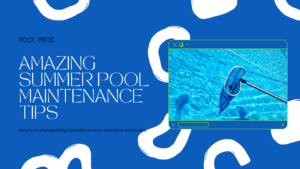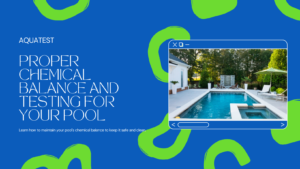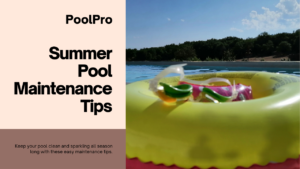
Get ready to make a splash this summer with our amazing pool maintenance tips. Whether you’re a seasoned pool owner or new to the world of pool care, we’ve got you covered. In this section, we’ll share expert advice on pool maintenance, pool cleaning tips, maintaining the right chemical balance, and taking care of your equipment to ensure your pool is summer-ready. So, dive in and let’s get started!
Key Takeaways:
- Regular pool maintenance is essential for a clean and safe swimming environment.
- Proper pool cleaning and skimming help remove debris and maintain water clarity.
- Maintaining the right chemical balance is crucial for safe and enjoyable swimming.
- Take care of your pool equipment to ensure optimal performance.
- Preventing algae growth is key to maintaining crystal-clear water.
Pool Cleaning and Skimming Tips During Summer
Keeping your pool clean during the summer months is essential for a refreshing and enjoyable swimming experience. With these effective pool cleaning and skimming tips, you can maintain a sparkling clean pool all season long. Say goodbye to debris and hello to crystal-clear water!
Skimming Tips
Skimming is a vital step in pool maintenance that helps remove floating debris such as leaves, insects, and other unwanted debris from the surface of the water.
- Invest in a quality skimmer net with a telescopic pole for easy reach across the entire pool.
- Skim the water surface at least once a day, especially after storms or windy days when debris tends to accumulate.
- Focus on areas near the pool edges and corners, where debris tends to gather.
- Remove larger debris first, then skim smaller particles to ensure a thorough cleaning.
Regular skimming not only keeps your pool clean but also prevents clogged filters and improves water circulation, contributing to a healthier swimming environment.
Debris Removal
While skimming is effective in removing surface debris, debris removal from the pool bottom is equally important for optimal cleanliness.
- Use a pool vacuum or automatic pool cleaner to remove debris settled on the pool floor.
- Manually brush the pool walls and floor to loosen any stubborn dirt or algae buildup.
- Empty the skimmer and pump baskets regularly to prevent clogging and optimize filtration.
- Consider using a pool cover when the pool is not in use to minimize debris accumulation.
By regularly removing debris from your pool, you can prevent water contamination and ensure a pristine swimming experience.
| Skimming Tips | Debris Removal Tips |
|---|---|
| Invest in a quality skimmer net with a telescopic pole for easy reach across the entire pool. | Use a pool vacuum or automatic pool cleaner to remove debris settled on the pool floor. |
| Skim the water surface at least once a day, especially after storms or windy days. | Manually brush the pool walls and floor to loosen any stubborn dirt. |
| Focus on areas near the pool edges and corners, where debris tends to gather. | Empty the skimmer and pump baskets regularly to prevent clogging. |
| Remove larger debris first, then skim smaller particles to ensure a thorough cleaning. | Consider using a pool cover when the pool is not in use to minimize debris accumulation. |
Pool Cleaning Essentials for Summer
When it comes to keeping your pool clean during the summer season, having the right tools and equipment is essential. With the proper cleaning essentials, you can easily maintain a sparkling pool for endless hours of fun and relaxation. From brushes to nets, here are the must-have items that will make your pool cleaning tasks a breeze.
1. Pool Brushes
To effectively remove dirt, algae, and other debris from the pool walls and floor, invest in a high-quality pool brush. The bristles of the brush will help scrub away stubborn stains, ensuring a clean and inviting pool environment.
2. Skimmer Nets
A skimmer net is a vital tool for removing leaves, bugs, and other floating debris from the pool’s surface. Regular skimming helps prevent the accumulation of dirt and keeps the water looking pristine. Make sure to choose a skimmer net with a durable frame and fine mesh for efficient debris removal.
3. Pool Vacuum
To maintain a truly clean pool, a pool vacuum is a game-changer. Whether you opt for a manual or automatic vacuum, this tool will help you remove dirt, sand, and small particles from the pool floor, leaving it spotless. Vacuuming your pool at least once a week will ensure a crystal-clear swimming experience.
4. Leaf Rake
During the summer months, trees often shed leaves that can quickly find their way into your pool. A leaf rake is designed to scoop up and remove larger debris, making it an indispensable tool for maintaining a debris-free pool.
5. Pool Test Kit
Ensuring proper water balance is crucial for the health and clarity of your pool. A reliable pool test kit will help you monitor the pH level, chlorine concentration, and other important water parameters. Regularly testing your pool water and making the necessary adjustments will ensure a safe and enjoyable swimming experience.
6. Pool Cover
A pool cover is not just for the offseason; it can also be beneficial during the summer months. Using a pool cover when the pool is not in use prevents debris from falling in and reduces evaporation, helping to conserve water and maintain chemical balance.
Investing in these pool cleaning essentials will make your summer maintenance routine a breeze. With the right tools in hand, you’ll be able to keep your pool clean, clear, and ready for endless summer fun.
Importance of Skimming and Debris Removal
Regular skimming and debris removal are essential aspects of pool maintenance that should not be overlooked. These simple practices play a crucial role in keeping your pool clean, preventing clogged filters, and maintaining water clarity.
Skimming involves using a net or skimmer to remove leaves, bugs, and other floating debris from the surface of the water. It is a quick and effective way to prevent these unwanted materials from sinking and accumulating at the bottom of the pool. By regularly skimming your pool, you can maintain a clean and inviting swimming environment.
Debris removal goes beyond skimming the surface. It also involves removing larger debris, such as branches or toys, that may have entered the pool. Neglecting to remove these objects can lead to various issues, including damage to pool equipment and potential injuries to swimmers.
Regular skimming and debris removal are key to maintaining a well-functioning and visually appealing pool.
One of the main benefits of skimming and debris removal is the prevention of clogged filters. When debris is left unattended, it can clog the pool’s filter system, causing it to become less efficient and potentially leading to costly repairs. By skimming and removing debris, you ensure that your pool’s filtration system operates at its best, promoting optimal water circulation and filtration.
Skimming and debris removal also contribute to water clarity. Leaving debris in the pool not only affects the overall appearance but can also lead to murky or cloudy water. Additionally, organic matter, such as leaves and bugs, can deteriorate in the water, creating an environment favorable for algae growth. Regular skimming and debris removal help maintain water clarity and prevent the formation of algae, keeping your pool clean and inviting.
Make skimming and debris removal a part of your routine pool maintenance. Regularly skim the surface of the water and remove any debris that accumulates. This practice will not only help prevent clogged filters and maintain water clarity but also contribute to the overall cleanliness and enjoyment of your pool.
Benefits of Skimming and Debris Removal:
- Prevents clogged filters
- Maintains water clarity
- Prevents algae formation
- Enhances pool cleanliness
- Prevents potential injuries
Proper Chemical Balance and Testing for Your Pool

Dive into the world of pool water chemistry and discover the keys to maintaining a safe and balanced swimming environment. The chemical balance of your pool water is essential for both the health of swimmers and the upkeep of your pool equipment. By testing your pool water regularly and making necessary adjustments, you can ensure crystal-clear water and a longer lifespan for your pool.
Why is Chemical Balance Important?
Chemical Balance: The key to a clean and safe swimming pool
The chemical balance refers to the levels of various chemicals in your pool water, such as pH, alkalinity, and chlorine. Maintaining the right balance is crucial because:
“Proper chemical balance is essential for comfortable and safe swimming conditions. It helps prevent the growth of harmful bacteria and algae, protects swimmers’ skin and eyes, and ensures efficient filtration and sanitization.”
Without the proper chemical balance, you may experience water that is too acidic or alkaline, causing discomfort, irritation, and potential damage to your pool and equipment.
Testing Your Pool Water
Pool Water Testing: Your guide to maintaining a balanced pool
Regularly testing your pool water is crucial to identify any imbalances and take appropriate corrective measures. Here’s how you can test your pool water:
- Use a pool water testing kit, which includes test strips or reagents.
- Dip the test strip into the pool water or add the reagent according to the instructions provided.
- Wait for the specified time for the test results to develop.
- Compare the color changes on the test strip or use the provided color chart to determine the chemical levels.
By testing and monitoring your pool water regularly, you can catch any imbalances early on and make necessary adjustments to maintain a proper chemical balance.
Adjusting Chemical Levels
Maintaining a Balanced Pool: The key to a perfect swimming experience
If the testing reveals imbalances in your pool water chemistry, it’s essential to take prompt action to restore a proper chemical balance. Depending on the specific imbalance, you may need to:
- Adjust the pH level by adding pH increaser (sodium carbonate) or pH reducer (sodium bisulfate).
- Stabilize chlorine levels by adding chlorine tablets or liquid chlorine.
- Balance alkalinity by using alkalinity increaser or decreaser.
Refer to your pool water testing kit’s instructions or consult a pool professional for specific guidance on adjusting chemical levels based on your water test results.
Summary
Proper chemical balance is essential for maintaining a clean, safe, and enjoyable swimming pool. Regularly test your pool water, make necessary adjustments, and keep a close eye on the chemical levels to ensure a well-balanced pool environment. By doing so, you’ll create a swimming experience that is both refreshing and worry-free.
Understanding Pool Water Chemistry
Gaining a deeper understanding of pool water chemistry is essential for maintaining a balanced and healthy swimming environment. By monitoring and adjusting key chemical levels such as pH, alkalinity, and chlorine, you can ensure crystal-clear water and a pool that is safe for swimming.
Let’s take a closer look at these three crucial factors in pool water chemistry:
pH Levels
The pH level of your pool water determines its acidity or alkalinity. Maintaining the proper pH range of 7.4 to 7.6 is important for several reasons. Firstly, it ensures swimmer comfort by preventing eye and skin irritation. Additionally, maintaining the correct pH level helps optimize the effectiveness of chlorine and other sanitizers in keeping your pool free from harmful bacteria.
Alkalinity
Alkalinity refers to the ability of water to resist changes in pH. By maintaining the ideal range of 80 to 120 parts per million (ppm), you can stabilize the pH level of your pool water. Proper alkalinity levels help prevent pH fluctuations, ensuring that your pool water stays balanced and comfortable for swimmers.
Chlorine Levels
Chlorine is crucial for sanitizing your pool and keeping it free from harmful microorganisms. Ideally, the chlorine level in your pool should be maintained between 1.0 and 3.0 ppm (parts per million). This helps prevent the growth of bacteria, algae, and other contaminants that can affect water clarity and pose health risks to swimmers.
Understanding and maintaining the right chemical balance in your pool is essential for creating a safe and enjoyable swimming environment. Regularly testing and adjusting pH, alkalinity, and chlorine levels will help you achieve a perfectly balanced pool.
Tips for Maintaining the Right Chemical Balance
Proper chemical balance is crucial for keeping your pool water clean, clear, and safe for swimming. In this section, we will provide you with practical tips on maintaining the right chemical balance in your pool. With step-by-step instructions and expert advice, you’ll be able to easily adjust chemical levels and ensure the optimal condition of your pool water.
Regular Pool Water Testing
To maintain the chemical balance in your pool, it’s essential to regularly test the water. Use a reliable pool water testing kit to check the levels of pH, alkalinity, and chlorine. Regular testing will help you identify any imbalances and take appropriate measures to correct them.
To test the chemical levels, follow these steps:
- Collect a water sample from about elbow-depth in your pool. Be sure to use a clean container for accurate results.
- Dip the testing strip or insert the reagent into the water sample as per the instructions provided with the testing kit.
- Wait for the recommended amount of time and compare the color of the testing strip or the results obtained from the reagent with the reference chart.
- Based on the test results, you can determine precisely what adjustments need to be made to restore the chemical balance in your pool water.
Adjusting Chemical Levels
Once you have tested your pool water and identified any imbalances, it’s time to make the necessary adjustments. Here’s how you can adjust the chemical levels:
pH Level
pH level measures the acidity or alkalinity of your pool water. To raise or lower the pH level, you can use pH increaser or pH decreaser chemicals available at pool supply stores. Follow the instructions on the product packaging carefully and gradually make adjustments to achieve the desired pH level, which should ideally be between 7.2 and 7.6.
Alkalinity
Alkalinity acts as a buffer for the pH level and helps prevent rapid changes. To increase alkalinity, use an alkalinity increaser. To decrease alkalinity, you can add an acid such as muriatic acid or dry acid. Be cautious when handling these chemicals and always follow the manufacturer’s instructions.
Chlorine Level
Chlorine is essential for sanitizing your pool and keeping it free from harmful bacteria and algae. To adjust the chlorine level, you can use chlorine tablets, liquid chlorine, or granular chlorine. Add the appropriate amount of chlorine to achieve the recommended range of 1-3 parts per million (ppm) for residential pools.
Monitoring and Maintenance
After making the necessary adjustments to the chemical levels in your pool, it’s crucial to monitor them regularly. Test your pool water at least once a week to ensure that the chemical balance is maintained. Additionally, keep an eye on other factors such as pool usage, weather conditions, and the presence of debris, as these can affect the chemical balance over time.
By following these tips, you can maintain the right chemical balance in your pool and enjoy clean, clear, and safe water all season long.
Recommended Pool Water Chemical Levels
| Chemical | Ideal Range | Acceptable Range |
|---|---|---|
| pH Level | 7.2 – 7.6 | 7.0 – 7.8 |
| Alkalinity (ppm) | 80 – 120 | 60 – 180 |
| Chlorine (ppm) | 1 – 3 | 0.5 – 5 |
Preventing Algae Growth and Maintaining Water Clarity
Algae growth is a common issue that can quickly turn your pool water green and cloudy, affecting the overall aesthetics and water clarity. Preventing algae growth is an essential part of pool maintenance to ensure a more enjoyable swimming experience. In this section, we’ll share effective strategies and tips to prevent algae growth and maintain crystal-clear water in your pool.
1. Proper Chemical Balance
Maintaining the right chemical balance in your pool is crucial for preventing algae growth. Regularly test your pool water and ensure the pH level is between 7.2 and 7.6, alkalinity is between 80 and 120 ppm, and chlorine levels are within the recommended range. Balanced chemical levels create an environment that inhibits algae growth and promotes water clarity.
2. Adequate Filtration
A well-functioning filtration system is essential for removing debris, organic matter, and microscopic algae from your pool water. Clean or backwash your filter regularly to ensure optimal performance. Remember to clean or replace the filter media as recommended by the manufacturer.
3. Regular Brushing and Skimming
Brushing the walls, floor, and steps of your pool regularly helps prevent algae growth by removing any algae spores or biofilm buildup. Additionally, skimming the surface of the water with a net removes leaves, bugs, and other debris that can provide nutrients for algae to thrive.
4. Proper Water Circulation
Ensure proper water circulation in your pool by running the pump and filter system for the recommended duration. Adequate circulation helps distribute the chemicals evenly, prevents stagnant areas where algae can grow, and improves water clarity.
5. Sunlight Control
Excessive sunlight can contribute to algae growth in your pool. Consider using a pool cover when the pool is not in use to limit sun exposure. You can also strategically plant trees or install shade sails to provide some shade over the pool area.
6. Regular Pool Maintenance
Consistent pool maintenance practices, such as cleaning the skimmer and pump baskets, vacuuming the pool floor, and maintaining appropriate water levels, are essential for preventing algae growth. Regular maintenance helps keep your pool in optimal condition and minimizes the risk of algae blooms.
Causes of Algae Growth in Pools
Algae growth in pools can be a frustrating and unsightly problem. Understanding the common causes of algae growth is essential in preventing its occurrence. By identifying these causes and taking preventive measures, you can ensure your pool water remains clear and algae-free.
Sunlight
Excessive sunlight is one of the primary factors that contribute to algae growth in pools. Sunlight provides the necessary energy for algae to thrive and multiply rapidly. Areas of the pool that receive direct sunlight for long periods are particularly susceptible to algae infestation. To combat this, consider using pool covers, shade sails, or strategically placed umbrellas to limit the amount of sunlight reaching the pool water.
pH Imbalance
An imbalanced pH level is another common cause of algae growth. When the pH level of pool water is outside the ideal range (7.2 to 7.6), it creates an environment that is favorable for algae to proliferate. Low pH levels make the water acidic, while high pH levels make it alkaline, both of which create conditions that algae thrive in. Regularly test and adjust the pH of your pool water to maintain the right balance and prevent algae growth.
Lack of Proper Filtration
An inadequate or malfunctioning filtration system can also contribute to algae growth in pools. The filtration system plays a crucial role in removing debris, contaminants, and algae spores from the water. If the filtration system is not functioning optimally or if the filter media is dirty or clogged, it becomes less effective in preventing algae growth. Regularly clean and maintain your pool’s filtration system to ensure it is operating at its best.
Now that you are aware of the causes of algae growth in pools, it’s time to take preventive measures. By addressing issues such as sunlight exposure, pH imbalance, and filtration system maintenance, you can significantly reduce the likelihood of algae infestation. In the next section, we will explore effective methods to prevent algae growth and keep your pool water crystal clear for a refreshing swimming experience.
Ways to Prevent Algae and Keep Water Clear
Preventing algae growth is essential for maintaining clean and clear pool water. By following a few simple steps and implementing regular maintenance practices, you can keep your pool free from algae and ensure optimal water clarity.
1. Maintain Proper Chemical Levels
Proper chemical balance is crucial in preventing algae growth. Regularly test and adjust the pH, chlorine, and alkalinity levels in your pool water. This will create an environment that is inhospitable to algae and promote water clarity.
2. Clean and Brush Your Pool
Regular cleaning and brushing of your pool surfaces help to remove any potential sources of algae growth, such as debris and biofilm. Use a pool brush to scrub the walls, floor, and steps of your pool to prevent algae from gaining a foothold.
3. Skim and Vacuum Debris
Skimming the surface of your pool and vacuuming the bottom to remove leaves, bugs, and other debris is important in preventing algae formation. These organic materials can contribute to algae growth if left unattended.
4. Run the Pool Filter
The pool filter plays a crucial role in removing particles and contaminants that can contribute to algae growth. Ensure that your pool filter is running for the recommended duration each day to maintain adequate filtration and water clarity.
5. Limit Sunlight Exposure
Algae thrives in sunlight. Consider using a pool cover during periods of extended non-use to limit the amount of sunlight reaching your pool water. This can significantly reduce the risk of algae growth.
6. Use Algaecide
Adding an algaecide to your pool water can provide an extra layer of defense against algae growth. Choose a suitable algaecide and follow the manufacturer’s instructions for proper application.
7. Maintain Proper Water Circulation
Proper water circulation helps prevent stagnant areas where algae can flourish. Ensure that your pool’s circulation system is functioning correctly and that water is evenly distributed throughout the pool.
8. Regularly Check and Clean Pool Equipment
Dirty or malfunctioning pool equipment, such as filters and pumps, can contribute to algae growth. Regularly inspect, clean, and maintain your pool equipment to ensure optimal performance and prevent algae-related issues.
Tip: A clean and well-maintained pool is less likely to experience algae problems. Regularly follow the pool maintenance routines and keep a watchful eye on any signs of algae growth for prompt action.
| Methods | Effectiveness |
|---|---|
| Maintaining Proper Chemical Levels | High |
| Cleaning and Brushing | High |
| Skimming and Vacuuming Debris | High |
| Running the Pool Filter | High |
| Limiting Sunlight Exposure | Moderate |
| Using Algaecide | Moderate |
| Maintaining Proper Water Circulation | Moderate |
| Checking and Cleaning Pool Equipment | Moderate |
Effectiveness ratings: High – Very effective, Moderate – Moderately effective
Summer Pool Equipment Maintenance

To ensure your pool is ready for a summer filled with fun and relaxation, it’s crucial to take care of your pool equipment. Proper maintenance of pool filters, pumps, and other vital equipment will keep your pool running smoothly and extend the lifespan of your pool equipment.
Here are some essential tips to help you maintain your pool equipment:
1. Regularly clean and inspect pool filters
Pool filters play a vital role in keeping your pool water clean and free from debris. Regularly clean the filters according to the manufacturer’s instructions to prevent clogging and maximize their efficiency. Inspect the filters for any signs of damage or wear and replace them if necessary.
2. Check and lubricate pool pump components
The pool pump is the heart of your pool’s circulation system. Check the pump regularly for any leaks, unusual sounds, or reduced performance. Clean out any debris that may have accumulated in the pump basket. Don’t forget to apply lubricant to the pump’s moving parts as recommended by the manufacturer to ensure smooth operation.
3. Inspect and adjust pool heater settings
If you have a pool heater, check its settings and ensure it is functioning properly. Inspect the heater for any signs of damage or corrosion. If you notice any issues, contact a professional to perform the necessary repairs or maintenance.
4. Maintain proper water chemistry
Proper water chemistry is essential for both the longevity of your pool equipment and the safety of swimmers. Regularly test and adjust the pool water’s pH, alkalinity, and chlorine levels according to the recommended ranges. This will help prevent corrosion and scaling, which can damage your pool equipment.
Pro Tip: Consider using a pool cover when the pool is not in use to further protect your equipment from the elements and reduce evaporation and chemical usage.
By following these maintenance tips, you can ensure that your pool equipment remains in top shape throughout the summer season. Remember, proper equipment care not only prolongs the life of your pool equipment but also enhances the overall enjoyment of your swimming experience.
FAQ
Q. What are some pool cleaning and skimming tips for the summer?
A. During the summer, it’s important to regularly clean and skim your pool to remove debris such as leaves, insects, and dirt. Use a pool skimmer net to skim the surface of the water, and brush the pool walls and floor to dislodge any stubborn dirt. Additionally, make sure to clean out your pool’s skimmer and pump baskets to prevent clogs.
Q. What are the essential tools and equipment for pool cleaning in the summer?
A. To effectively clean your pool during the summer, you’ll need a few key tools. These include a pool brush for scrubbing the walls and floor, a pool skimmer net for removing debris from the surface, and a pool vacuum for deep cleaning. It’s also handy to have a pool pole to attach these tools and reach all areas of the pool comfortably.
Q. Why is skimming and debris removal important for pool maintenance?
A. Regular skimming and debris removal are vital for pool maintenance as they help prevent clogged filters and ensure water clarity. Skimming removes debris from the surface before it sinks to the bottom, reducing the need for excessive cleaning and preventing the buildup of organic material that can lead to algae growth.
Q. How do I maintain the proper chemical balance in my pool?
A. Maintaining the right chemical balance in your pool involves regularly testing the water and adjusting chemical levels accordingly. You should monitor pH levels, alkalinity, and chlorine levels and make any necessary adjustments using appropriate pool chemicals. It’s also crucial to follow manufacturer guidelines and take safety precautions when handling chemicals.
Q. How can I prevent algae growth and keep my pool water clear?
A. To prevent algae growth and maintain clear pool water, it’s important to regularly sanitize your pool with chlorine or other suitable sanitizers. This helps kill algae spores and keeps the water safe for swimming. Additionally, maintaining proper water circulation, checking and cleaning pool filters, and removing debris promptly can help keep algae at bay.
Q. What are the common causes of algae growth in pools?
A. Algae growth in pools can be caused by various factors, including high temperatures, inadequate circulation, pH imbalance, insufficient chlorine levels, and the presence of organic material such as leaves and dirt. Lack of regular pool maintenance, improper filtration, and poor water chemistry management can also contribute to algae formation.
Q. How can I prevent algae growth and keep my pool water clear?
A. There are several effective ways to prevent algae growth and maintain clear pool water. These include regularly testing and adjusting chemical levels, maintaining proper water circulation and filtration, keeping pool surfaces clean, and using algaecides as a preventive measure. It’s also essential to maintain the appropriate chlorine residual and shock the pool regularly to kill any lurking algae spores.
Q. Why is summer pool equipment maintenance important?
A. Regular summer pool equipment maintenance is crucial for the optimal functioning of your pool. Properly maintained filters and pumps ensure clean and clear water circulation, reducing the risk of equipment failure. Regular inspections can also help identify any potential issues early on, preventing costly repairs or replacements.
Q. How can I ensure pool safety during the summer?
A. To ensure pool safety during the summer, it’s important to keep the pool area and surroundings well-maintained. Regularly inspect the pool fence and gates to ensure they are secure, maintain proper pool chemical levels to prevent skin and eye irritation, and provide supervision when children are near the pool. It’s also essential to have safety equipment such as life jackets and pool alarms readily available.
Conclusion
Congratulations on taking the first step towards maintaining a beautiful and sparkling pool this summer! By following the expert pool maintenance tips provided in this article, you can ensure that your pool remains clean, safe, and inviting for your family and friends.
Regular pool maintenance, including cleaning, skimming, and debris removal, is crucial to prevent clogged filters and maintain water clarity. Investing in the right cleaning tools and equipment can make the process easier and more efficient.
Additionally, maintaining the correct chemical balance in your pool is essential for a healthy swimming environment. Regularly test your pool water and make necessary adjustments to the pH, alkalinity, and chlorine levels to keep the water balanced and safe.
To prevent algae growth and maintain crystal-clear water, remember to incorporate preventive measures such as proper filtration, limiting sunlight exposure, and regular cleaning. Finally, don’t forget to take care of your pool equipment to ensure its optimal performance throughout the summer season.
By following these Pool Maintenance and Summer Pool Care tips, you can relax and enjoy the refreshing experience of swimming in a well-maintained pool all summer long. So dive in, have fun, and make the most of your pool this summer!
















